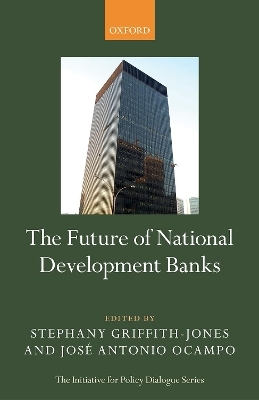
The Future of National Development Banks
Oxford University Press (Verlag)
978-0-19-882794-8 (ISBN)
For a long time the topic of national development banks was limited to a debate between admirers and detractors of these institutions, often inserted into a more general debate of state versus markets. Since the 2007/8 North Atlantic financial crisis however, interest and support for these institutions has broadly increased in both developing and developed countries. Key issues such as understanding how development banks work, what their main aims are, and what their links with the private financial and corporate sector are have come to the forefront, and there is an increased interest in what instruments, incentives, and governance work better in general and in particular contexts.
The Future of National Development Banks provides an in-depth study of several key examples of these institutions based in Brazil, Chile, China, Colombia, Germany, Mexico, and Peru. It explores horizontal issues such as their role in innovation and structural change, sustainable infrastructure financing, financial inclusion, and regulatory rules. It provides both research and policy-oriented perspectives on how these banks can make a significant contribution to a countries' development, and analyses their roles within broader economic policy, their governance, and the main instruments they use to perform their function.
The Future of National Development Banks has important policy implications for countries that have these institutions and can improve them, and countries that do not have them yet and can learn from best practice.
Stephany Griffith-Jones is Financial Markets Director at the Initiative for Policy Dialogue at Columbia University, US, and Emeritus Professorial Fellow, at the Institute of Development Studies, Sussex University, UK. She specializes in national and international finance from a development perspective, capital flows and their management in different regions, and development finance. Griffiths-Jones has written or edited twenty-five books, including Time for a Visible Hand (Oxford University Press, 2010), and numerous articles. She has advised many international organizations including FEPS, the European Parliament, the World Bank, IADB, AfDB, and various UN agencies. She began her career at CORFO, the Chilean development bank. José Antonio Ocampo is a Member of the Board of Directors at Banco de la República, Colombia's central bank, Chair of the UN Committee for Development Policy, and Professor (on leave) from Columbia University. He has been UN Under-Secretary-General for Economic and Social Affairs, Executive Secretary of the UN Economic Commission for Latin America and the Caribbean, and Minister of Finance, Minister of Agriculture and Director of the National Planning of Colombia. He has received the 2012 Vicens Vives award for the best book on Latin American economic history, the 2008 Leontief Prize in Economics, and the 1988 Alejandro Angel Escobar National Science Award of Colombia. He has published extensively on macroeconomic theory and policy, international financial issues, economic and social development, international trade, and Colombian and Latin American economic history.
1: Stephany Griffith-Jones, José Antonio Ocampo, Felipe Rezende, Alfredo Schclarek, and Michael Brei: The Future of National Development Banks
Part I: Case Studies
2: Qiyuan Xu: China Development Bank: Born Bankrupt, Born Shaper
3: Ulf Moslener, Matthias Thiemann, and Peter Volberding: National Development Banks as Active Financiers: The Case of KfW
4: Rogério Studart and Luma Ramos: The Future of Development Banks: The Case of Brazil's BNDES
5: Juan Carlos Moreno-Brid, Esteban Pérez Caldentey, and Laura Valdez: Changing Challenges in the Modernization of Nacional Financiera: Mexico's Key Development Bank
6: Stephany Griffith-Jones, María Luz Martínez Sola, and Javiera Petersen: The role of CORFO in Chile's Development: Achievements and Challenges
7: José Antonio Ocampo and Paola Arias: Colombia's System of National Development Banks
8: Oscar Dancourt and Renzo Jiménez: The Experience of Development Banking in Peru: 1990-2015
Part II: Thematic Issues
9: Lavinia Barros de Castro: Financial Regulation and Risk Management in Development Banks
10: Mariana Mazzucato and Caetano C.R. Penna: National Development Banks and Mission-Oriented Finance for Innovation
11: Michael Brei and Alfredo Schclarek: The Countercyclical Behavior of National Development Banks in Latin America and the Caribbean
12: Felipe Carvalho de Rezende: Financial Stability and Infrastructure: The Role of Development Banks
13: Stephany Griffith-Jones, Jose Antonio Ocampo, and Paola Arias: Conclusions
| Erscheinungsdatum | 05.11.2018 |
|---|---|
| Reihe/Serie | Initiative for Policy Dialogue |
| Verlagsort | Oxford |
| Sprache | englisch |
| Maße | 163 x 243 mm |
| Gewicht | 752 g |
| Themenwelt | Wirtschaft ► Betriebswirtschaft / Management ► Finanzierung |
| Betriebswirtschaft / Management ► Spezielle Betriebswirtschaftslehre ► Bankbetriebslehre | |
| Wirtschaft ► Volkswirtschaftslehre ► Finanzwissenschaft | |
| Wirtschaft ► Volkswirtschaftslehre ► Makroökonomie | |
| ISBN-10 | 0-19-882794-6 / 0198827946 |
| ISBN-13 | 978-0-19-882794-8 / 9780198827948 |
| Zustand | Neuware |
| Informationen gemäß Produktsicherheitsverordnung (GPSR) | |
| Haben Sie eine Frage zum Produkt? |
aus dem Bereich


